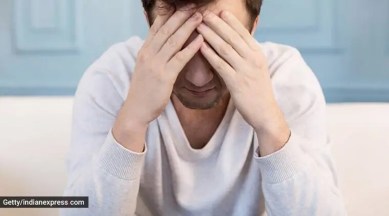📣 For more lifestyle news, click here to join our WhatsApp Channel and also follow us on Instagram
Can H3N2 also cause sleep deficiency like Covid-19?
Notably, Covid-19 has been known to cause a range of sleep-related symptoms, including disrupted sleep patterns, insomnia, excessive daytime sleepiness, and vivid dreams

It needs no reminding that Coronavirus caused sleep issues in many people, leading to insomnia — a phenomenon that came to be known as coronasomnia. Now, turns out, experts are seeing patients diagnosed with H3N2 presenting with similar symptoms. “Yes, we have observed sleep disturbances very similar to H1N1 or Covid-19 with H3N2 patients”, said Dr Sanjith Saseedharan, consultant and head-critical care, SL Raheja Hospital, Mahim-A Fortis Associate.
According to him, narcolepsy-like patterns, characterised by excessive daytime fatigue and difficulty in falling asleep at night (called sleep latency), have been on the rise. “This disordered sleep pattern has become more prevalent in patients. One of the effects of sleep latency is vivid nightmares, which tend to occur with non-restful sleep. Patients affected with this symptom also seem to be more fatigued as the sleep disorder progresses,” he said.
monthly limit of free stories.
with an Express account.
However, according to Dr Saseedharan, a majority of patients are complaining of the usual sore throat, fever, and cough, “with a very small minority seems to be having sleep complaints after H3N2″.
H3N2 is typically the seasonal flu virus, influenza A. “So, every now and then, the infections that we keep getting are either H3N2 or H1N1. These are the commonest influenza infections, followed by influenza B. Common cold is layman’s term for all respiratory infections which cause symptoms of a cold, which means nasal congestion, runny nose, and sneezing which can be there because of influenza, or due to other viruses like rhinoviruses or RS viruses,” noted Prof Dr SK Chhabra, head of the department, Pulmonary, Primus Hospital, New Delhi.
Notably, Covid-19 has been known to cause a range of sleep-related symptoms, including disrupted sleep patterns, insomnia, excessive daytime sleepiness, and vivid dreams. According to experts, these symptoms may be related to the immune response and inflammation caused by the virus, as well as other factors such as stress and anxiety.
Those affected with sleep-related problems seem to suffer from this for a prolonged period, added Dr Saseedharan. “No specific subgroup of patients appears to be immune to this disorder, as it can affect anyone with H3N2 viral illness,” he mentioned.
Stressing that persistent cough and excessive fatigue, along with inability to sleep, are some of the symptoms that have afflicted patients who come down with H3N2 virus, Dr Shrey Srivastav, MD (Internal Medicine), Sharda Hospital, Noida said that sometimes viruses affect the nerves in brain and sometime can cause the body’s immune system to turn against the body with the virus itself releasing large number of inflammatory markers, which can disturb sleep cycle.
However, not everyone agrees. Dr Surbhi Bansal Agrawal, general physician, Lybrate said, “While influenza can be a serious illness and cause a variety of complications, including pneumonia, there is currently no evidence to suggest that H3N2 has any specific sleep repercussions similar to those seen in Covid-19.”
It is nevertheless important to “note that any illness, including influenza, can cause disruptions to your overall health, which can, in turn, impact your sleep quality”. “Getting plenty of rest and following good sleep hygiene practices can help support your body’s immune system and aid in recovery from illness. If you are experiencing sleep disturbances or other symptoms related to influenza or Covid-19, it’s always best to speak with a healthcare professional for personalised advice and treatment recommendations,” Dr Agrawal told indianexpress.com.
📣 For more lifestyle news, follow us on Instagram | Twitter | Facebook and don’t miss out on the latest updates!
📣 For more lifestyle news, click here to join our WhatsApp Channel and also follow us on Instagram